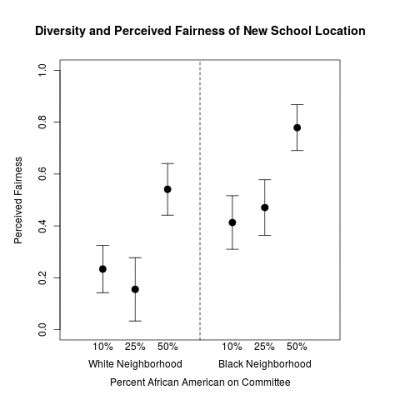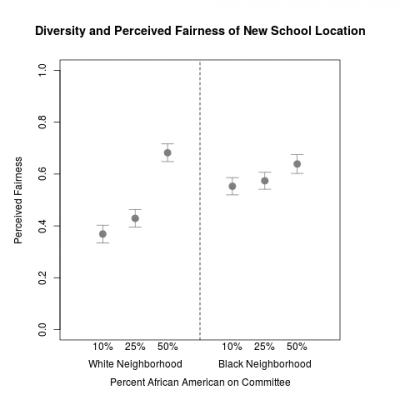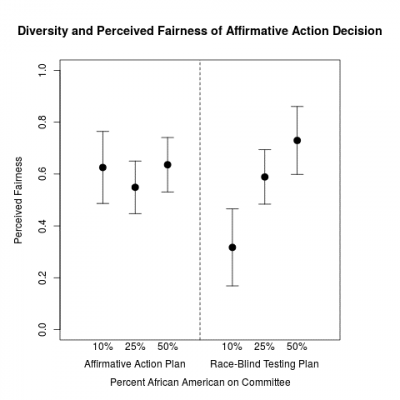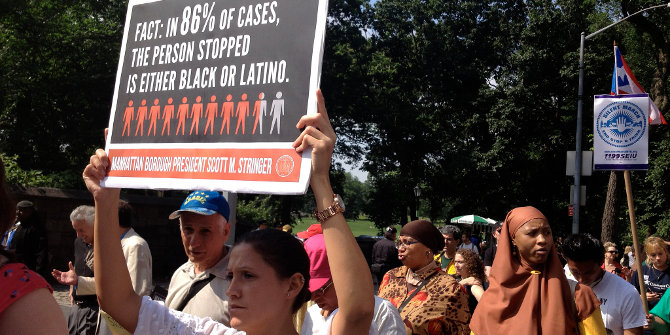
 When a lack of diversity in decision-making bodies signals to citizens that the policymaking process is inherently unfair, then it increases the likelihood that any outcomes detrimental to minorities are perceived as the result of systematic bias rather than unfortunate circumstances. Research by Matthew Hayes and Matthew Hibbing finds that Americans’ satisfaction with public policy decisions is dependent on the racial composition of decision-makers, not only on the decisions themselves, suggesting that governments work to ensure their decision-making bodies are more inclusive.
When a lack of diversity in decision-making bodies signals to citizens that the policymaking process is inherently unfair, then it increases the likelihood that any outcomes detrimental to minorities are perceived as the result of systematic bias rather than unfortunate circumstances. Research by Matthew Hayes and Matthew Hibbing finds that Americans’ satisfaction with public policy decisions is dependent on the racial composition of decision-makers, not only on the decisions themselves, suggesting that governments work to ensure their decision-making bodies are more inclusive.
In the aftermath of the fatal 2014 police shooting of Michael Brown in Ferguson, MO, one of the starkest concerns of residents was the lack of diversity in local government. Despite being over two-thirds African American, Ferguson was led by a white mayor, a city council that had only one black member, and a predominantly white police force. This lack of diversity became a rallying cry for many protestors, and the consent decree Ferguson signed with the U.S. Department of Justice included efforts to improve diversity training and community policing.
With new Attorney General Jeff Sessions poised to roll back federal involvement in oversight of such cases of racial bias, the importance of racial diversity in local government may re-emerge as an important concern. If a lack of diversity signals to citizens that the policymaking process is inherently unfair, then it increases the likelihood that any outcomes detrimental to African Americans are perceived as the result of systematic bias rather than unfortunate circumstances. In our recent article, we investigate the extent to which diversity promotes or undermines satisfaction with the policymaking process in the context of local government. We argue that Americans’ satisfaction with public policy decisions is dependent not only on the decisions themselves, but also on the race of the decision-makers.
To test our argument, we ran a series of survey experiments on both a nationally representative survey (the 2014 Cooperative Campaign Analysis Project) and an online convenience sample (Amazon’s Mechanical Turk service). In our experiments, we provided respondents with a vignette that described a committee making a local political decision: whether to build a new school in a predominantly-white or predominantly-black neighbourhood. In these vignettes, we randomly varied the level of diversity of the committee; respondents read about a committee that was 10%, 25%, or 50% African American. We then asked respondents to rate how fair they thought the decision and the decision-making process were.
Our results suggest that African Americans are concerned not only with substantive public policy outcomes, but also with how those outcomes were reached. African Americans were substantially more satisfied with decision-making committees that included equal numbers of white and black members (see Figure 1). This was true regardless of the policy outcome of the committee; regardless of whether the school was to be built in a predominantly-white or black neighbourhood, African Americans preferred committees on which they had an equal voice.
Figure 1: Racially Diverse Committees Boost Fairness Among African Americans
 Interestingly, a similar pattern emerged for white Americans (see Figure 2). When levels of diversity reached parity, white Americans perceived the process as significantly fairer. This was especially true when the decision clearly went against the interests of the African American community. The fairest outcome in the minds of our white respondents was a policy decision that favoured a white neighbourhood, but was reached by a diverse committee.
Interestingly, a similar pattern emerged for white Americans (see Figure 2). When levels of diversity reached parity, white Americans perceived the process as significantly fairer. This was especially true when the decision clearly went against the interests of the African American community. The fairest outcome in the minds of our white respondents was a policy decision that favoured a white neighbourhood, but was reached by a diverse committee.
Figure 2: Racially Diverse Committees Boost Fairness Among White Americans
 Since this policy decision — where to build a local school — might be less salient for many Americans, we replicated our study using a policy area with strong ideological divisions — Affirmative Action. In a vignette on Amazon’s Mechanical Turk, we described a local committee deciding whether to implement an Affirmative Action plan to boost diversity on the police force, or an ostensibly “race-blind” plan to implement stricter testing of police applicants and boost quality. Given the overwhelming attention paid to race and policing in the United States, this topic should have been highly salient for our respondents.
Since this policy decision — where to build a local school — might be less salient for many Americans, we replicated our study using a policy area with strong ideological divisions — Affirmative Action. In a vignette on Amazon’s Mechanical Turk, we described a local committee deciding whether to implement an Affirmative Action plan to boost diversity on the police force, or an ostensibly “race-blind” plan to implement stricter testing of police applicants and boost quality. Given the overwhelming attention paid to race and policing in the United States, this topic should have been highly salient for our respondents.
Our findings again demonstrate that the composition of decision-making bodies is important for establishing the fairness of public policy. As we would expect from public opinion polls, African Americans generally preferred decisions implementing Affirmative Action to those implementing a “race-blind” policy (see Figure 3). But this difference in preference disappeared when the decision-making body was more diverse. When 25% or 50% of the decision-makers were African American, our black respondents were as supportive of a “race-blind” policy as those reading about an Affirmative Action policy. This suggests that African Americans care deeply not just about policy outcomes, but also about policy processes. When given an equal seat at the table, most of our black respondents were willing to perceive race-blind decisions as fair.
Figure 3: Racially Diverse Committees Compensate for Anti-Affirmative Action Decisions
 One important caveat from this research is that the level of diversity that appears necessary to boost African Americans’ perceptions of fairness is quite high. Although African Americans make up only around 13% of the national population, only committees that are substantially more diverse can ensure that policy outcomes will be perceived as fair. When deciding to build a school in a white neighbourhood, the committee needed to be 50% black to ensure that African Americans would perceive the decision as fair. When making an anti-affirmative action decision, this number was lower (25%), but still substantially higher than African Americans’ proportion in the U.S. population.
One important caveat from this research is that the level of diversity that appears necessary to boost African Americans’ perceptions of fairness is quite high. Although African Americans make up only around 13% of the national population, only committees that are substantially more diverse can ensure that policy outcomes will be perceived as fair. When deciding to build a school in a white neighbourhood, the committee needed to be 50% black to ensure that African Americans would perceive the decision as fair. When making an anti-affirmative action decision, this number was lower (25%), but still substantially higher than African Americans’ proportion in the U.S. population.
Taken together, our findings have implications for Americans’ levels of satisfaction with public policy outcomes. They suggest that it may not be enough for governments to reach the outcomes people prefer. Rather, governments must work hard to make sure that decision-making bodies provide an equal seat at the table for those most likely to be affected by policy.
This article is based on the paper “The Symbolic Benefits of Descriptive and Substantive Representation” in Political Behavior.
“House Appropriations Committee, Subcommittee on Homeland Security, Fiscal Year 2014 Budget Request (8659620709)” by Josh Denmark is licensed under Wikimedia Commons.
Please read our comments policy before commenting.
Note: This article gives the views of the author, and not the position of USAPP – American Politics and Policy, nor of the London School of Economics.
Shortened URL for this post: http://bit.ly/2rszpz9
________________________________
 Matthew Hayes – Indiana University, Bloomington
Matthew Hayes – Indiana University, Bloomington
Matthew Hayes is Assistant Professor of Political Science at Indiana University, Bloomington. His research focuses on political behaviour, racial and ethnic politics, and political representation. His current research focuses on the role of racial rhetoric in legislatures, and their effect on the representation of traditionally under-represented groups. He has published his research in journals including the Journal of Politics, Legislative Studies Quarterly, Political Behavior, and Social Science Quarterly.
 Matthew Hibbing – University of California, Merced
Matthew Hibbing – University of California, Merced
Matthew Hibbing is Associate Professor of Political Science at the University of California, Merced. He studies American politics with a focus on political behaviour, political psychology and the influence of biology on mass politics. His research centers on individual-level predispositions that shape political attitudes and behaviours, including personality and physiological traits, and it has published in a number of journals, including Science, the American Political Science Review, the British Journal of Political Science, the Journal of Politics, Legislative Studies Quarterly, Political Behavior, and Political Psychology.







What if it’s clear that less qualified individuals were chosen in order to meet a politically correct quota? I’m sure that this would create less “satisfaction with public policy decisions.”
There was a book out called Stealth Democracy that said people in general were more interested in the process than the result. This only confirms it.